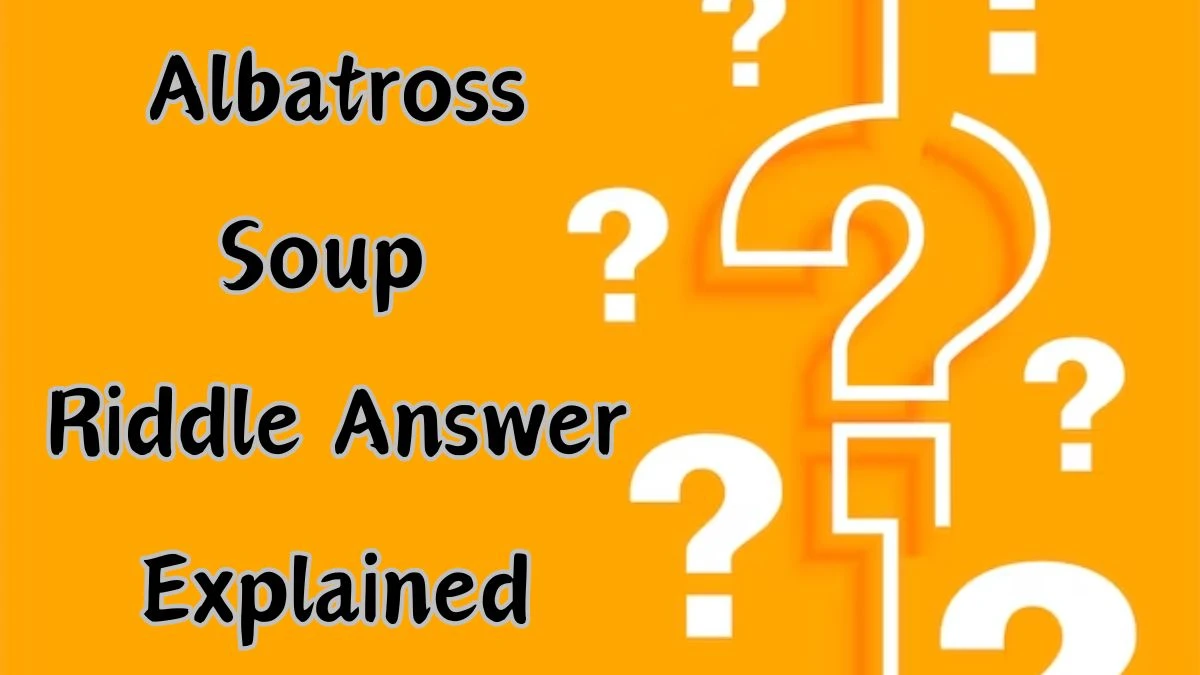- Rojgarlive »
- Riddle »
- Albatross Soup Riddle Answer Explained
Albatross Soup Riddle Answer Explained
by Preethi
Updated Feb 15, 2024

Albatross Soup Riddle
The Albatross Soup riddle tells the story of a man who orders albatross soup at a restaurant, takes one bite, then leaves and jumps off a cliff. The solution lies in understanding that the man had a disturbing experience in the past: he was stranded on a desert island with other survivors, where he unknowingly ate the flesh of one of his companions.
When he tastes the soup and realizes it doesn't match his memory of that experience, he is overwhelmed with guilt and chooses to end his life. In simpler terms, the man's decision to jump off the cliff was because the taste of the soup reminded him of a traumatic event from his past, causing him to feel extreme remorse and take his own life as a result.
Albatross Soup Riddle Answer Explained
In the Albatross Soup riddle, a man orders soup at a restaurant, but after one bite, he leaves and jumps off a cliff. The reason behind his actions is that the taste of the soup triggers a memory from his past. He recalls being stranded on an island where he ate his fellow survivor to survive. Realizing that the soup tastes different from what he remembers, he feels guilty and chooses to end his life by jumping off the cliff. So, the answer to the riddle is that the man's tragic past catches up with him when he tastes the soup, leading to his decision to take his own life.
Albatross Soup Riddle Answer: Remorse
What is Riddle?
A riddle is like a puzzle wrapped in words, where a statement or question has a sneaky, hidden meaning that you need to uncover. There are two main types: enigmas, which are tricky problems expressed in fancy language, demanding you to think cleverly for the solution, and conundra, which involve playing with words in either the question or the answer. It's like a little linguistic game that challenges your brain.
Imagine it as a universal art form, found in cultures worldwide, each crafting their unique puzzles. Riddles, unlike myths that establish social norms, enjoy teasing the boundaries of ideas, showing that things aren't as straightforward as they seem. They playfully dance with concepts, making us think deeper and, in the end, affirming the importance of those boundaries.
How to Solve a Riddle?
Read Carefully:
Begin by thoroughly reading the riddle. Pay close attention to every word and detail. Sometimes, the solution lies in subtle nuances.
Identify Key Elements:
Identify the key elements or clues in the riddle. Look for words or phrases that might have double meanings or stand out as essential to solving the puzzle.
Think Creatively:
Riddles often require creative thinking. Consider different interpretations of the words and phrases presented. Don't limit yourself to the most obvious meanings.
Consider Wordplay:
Many riddles involve wordplay, such as puns or homophones. Explore whether any words have dual meanings or sound similar to other words that could provide a clue.
Look for Patterns:
Some riddles follow specific patterns or have a consistent theme. If you notice a recurring element or structure, it could be a clue to the solution.
Use Context:
Consider the context of the riddle. Sometimes, understanding the context or background information can lead you to the correct answer.
Test Hypotheses:
Once you have a potential solution in mind, test it against the clues provided in the riddle. Does it fit all the criteria? If not, reassess and try a different approach.
Collaborate:
If you're stumped, discussing the riddle with others can provide new perspectives. Group brainstorming can lead to breakthroughs and shared insights.
Patience is Key:
Solving riddles may take time. Be patient and don't get discouraged. Sometimes, stepping away and returning with fresh eyes can make a difference.
Learn from Solutions:
Whether you solve the riddle or not, take note of the solution. Understanding how the puzzle was crafted can enhance your riddle-solving skills for future challenges.
Riddle Solving Benefits
Thinking Skills:
Solving riddles helps your brain think better. It makes you look at things in different ways and figure out tricky problems.
Problem-Solving:
Riddles are like puzzles. They make you find solutions to challenges, teaching you how to think and solve problems smartly.
Being Creative:
Riddles are like little games for your imagination. They make you think creatively, which is helpful not just in fun stuff but also in subjects like math and science.
Remembering Things:
When you solve riddles, you need to remember details. This helps improve your memory, making it easier for you to remember things in school or in everyday life.
Working Together:
Some riddles are better solved with friends. Figuring them out together helps you work as a team, making you good at working with others.
Feeling Proud:
When you solve a tricky riddle, it feels like you achieved something cool. It boosts your confidence and makes you feel proud of yourself.
Learning New Words:
Riddles introduce you to new words. It's like a fun way to learn and use words you might not have known before.
Albatross Soup Riddle Answer Explained - FAQs
It's a riddle about a man who orders soup, tastes it, then jumps off a cliff.
Read carefully, identify clues, think creatively, consider wordplay, and test hypotheses.
Improved thinking skills, problem-solving abilities, creativity, memory, teamwork, and confidence.
A puzzle wrapped in words, often with hidden meanings or wordplay.
They challenge our minds, encourage creative thinking, and offer a sense of accomplishment when solved.




